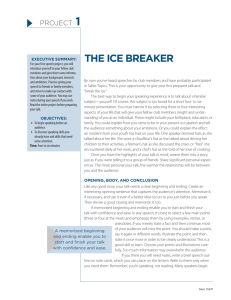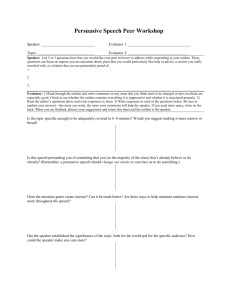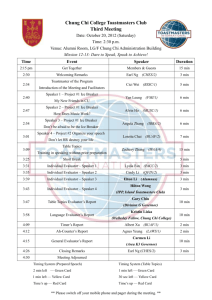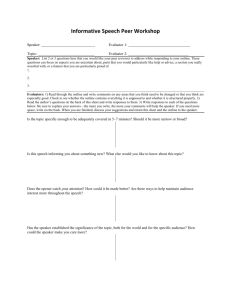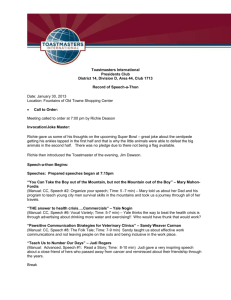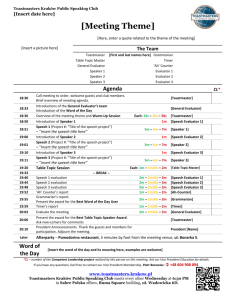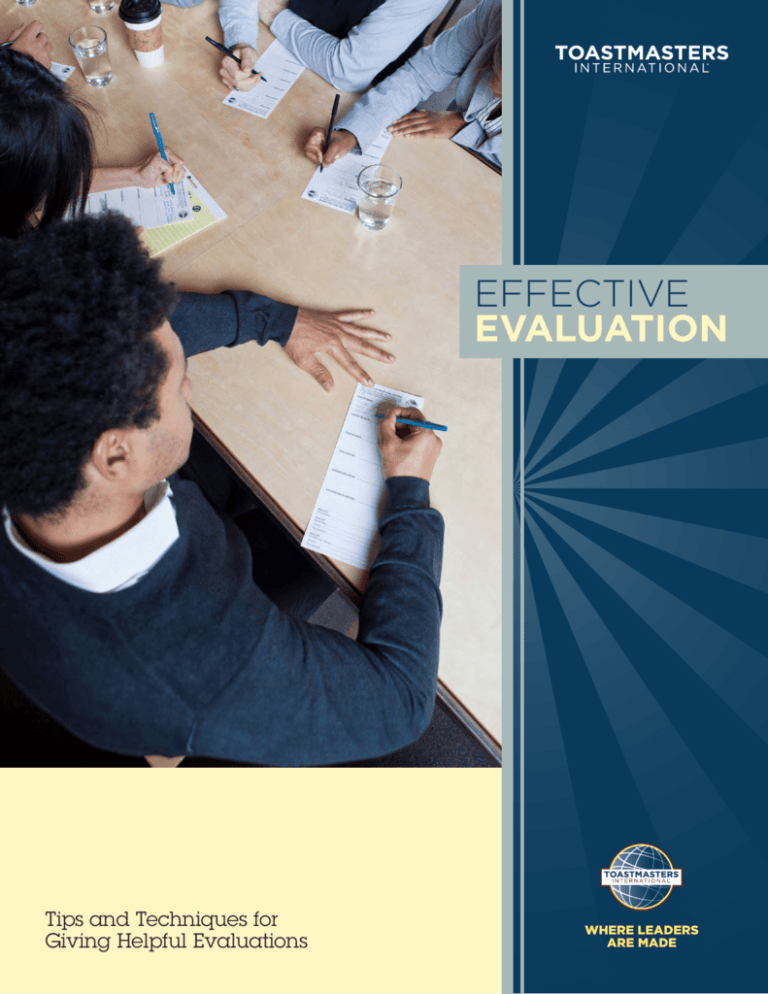
EFFECTIVE
EVALUATION
Tips and Techniques for
Giving Helpful Evaluations
WHERE LEADERS
ARE MADE
EFFECTIVE
EVALUATION
TOASTMASTERS INTERNATIONAL
P.O. Box 9052 • Mission Viejo, CA 92690 USA
Phone: 949-858-8255 • Fax: 949-858-1207
www.toastmasters.org/members
© 2011 Toastmasters International. All rights reserved. Toastmasters International,
the Toastmasters International logo, and all other Toastmasters International
trademarks and copyrights are the sole property of Toastmasters International
and may be used only with permission.
Rev. 6/2011
WHERE LEADERS
ARE MADE
CONTENTS
Introduction . . . . . . . . . . . . . . . . . . . . . . . . . . . . . . . . . . . . . . . . . . . . . . . . . . . . . . . . . . . . . . . . . . . . . . . . . . . . . . . . . . . . . . . . . . . . . . 3
When You Are the Evaluator . . . . . . . . . . . . . . . . . . . . . . . . . . . . . . . . . . . . . . . . . . . . . . . . . . . . . . . . . . . . . . . . . . . . . . . . . . . . . 3
The Evaluator’s Role . . . . . . . . . . . . . . . . . . . . . . . . . . . . . . . . . . . . . . . . . . . . . . . . . . . . . . . . . . . . . . . . . . . . . . . . . . . . . . . . . . 3
How to Prepare . . . . . . . . . . . . . . . . . . . . . . . . . . . . . . . . . . . . . . . . . . . . . . . . . . . . . . . . . . . . . . . . . . . . . . . . . . . . . . . . . . . . . . 4
Your Evaluation . . . . . . . . . . . . . . . . . . . . . . . . . . . . . . . . . . . . . . . . . . . . . . . . . . . . . . . . . . . . . . . . . . . . . . . . . . . . . . . . . . . . . . 4
How You Say It . . . . . . . . . . . . . . . . . . . . . . . . . . . . . . . . . . . . . . . . . . . . . . . . . . . . . . . . . . . . . . . . . . . . . . . . . . . . . . . . . . . . . . 5
Your Delivery . . . . . . . . . . . . . . . . . . . . . . . . . . . . . . . . . . . . . . . . . . . . . . . . . . . . . . . . . . . . . . . . . . . . . . . . . . . . . . . . . . . . . . . . 5
As You Conclude . . . . . . . . . . . . . . . . . . . . . . . . . . . . . . . . . . . . . . . . . . . . . . . . . . . . . . . . . . . . . . . . . . . . . . . . . . . . . . . . . . . . 5
Follow Up with the Speaker . . . . . . . . . . . . . . . . . . . . . . . . . . . . . . . . . . . . . . . . . . . . . . . . . . . . . . . . . . . . . . . . . . . . . . . . . . 6
Follow Up with the Audience . . . . . . . . . . . . . . . . . . . . . . . . . . . . . . . . . . . . . . . . . . . . . . . . . . . . . . . . . . . . . . . . . . . . . . . . 6
When You Are the Speaker or Leader . . . . . . . . . . . . . . . . . . . . . . . . . . . . . . . . . . . . . . . . . . . . . . . . . . . . . . . . . . . . . . . . . . . 6
Put Some Variety into Evaluations . . . . . . . . . . . . . . . . . . . . . . . . . . . . . . . . . . . . . . . . . . . . . . . . . . . . . . . . . . . . . . . . . . . . . . 7
Would You Like to Learn More? . . . . . . . . . . . . . . . . . . . . . . . . . . . . . . . . . . . . . . . . . . . . . . . . . . . . . . . . . . . . . . . . . . . . . . . . . . 7
Recommended Evaluation Tools . . . . . . . . . . . . . . . . . . . . . . . . . . . . . . . . . . . . . . . . . . . . . . . . . . . . . . . . . . . . . . . . . . . . . . . . 8
2 EFFECTIVE EVALUATION
P
ublic speaking and leadership are skills that can be developed and improved. In
Toast­masters, feedback is called evaluation, and it is the heart of the Toastmasters
educational program. You observe the speeches and leadership roles of your fellow
club members and offer evaluations of their efforts, and they do the same for you. If you
truly want to improve your speaking and leadership skills, you must learn how to give and
receive helpful evaluations.
INTRODUCTION
Have you ever helped your child with a school assignment? Been asked by a co-worker for advice on a
­project? Offered suggestions to local ­government?
If you have, you have been an evaluator. You have listened to and observed others and their work and
offered feedback. You evaluate in some manner every day, at home, at the office, and in the community.
People join Toastmasters clubs to improve their speaking and leadership skills, and these skills are
improved through evaluations. Members prepare and present speeches based on projects in the Competent Communication manual, or they serve in leadership roles while ­completing ­projects in the Competent
Leadership manual. Their fellow club ­members evaluate the speeches or leadership efforts, enabling the
­members to develop their speaking or leadership skills.
The tone and content of an evaluation have great impact on the speaker and even on the club. A harsh
evaluation may cause a member to leave the club. An overly kind evaluation may not help the member to
improve, making the member frustrated and unhappy. Good evaluators strive to find a balance between the
extremes, giving evaluations that are ­helpful and encouraging.
Although most of the time you will be evaluating others in the club, the skills you learn can be applied
in all aspects of your life. You will become a better listener and a more critical thinker. By reading this manual
carefully and applying its tips and techniques to your evaluations, you will quickly be able to give helpful,
positive, constructive evaluations that will motivate and genuinely help the receiver. You will also learn about
other evaluation methods and resources available to help you and your fellow club members, and about how
your club can evaluate itself to ensure the club is meeting member needs.
WHEN YOU ARE THE EVALUATOR
The Evaluator’s Role
Your purpose as an evaluator is to ­provide honest reaction in a constructive manner to the person’s efforts,
using the evaluation guides provided. You are not a judge or an author­ity on speaking or ­leadership. When
you evaluate, you are simply giving your own reaction to the person’s speaking or leadership efforts. An evaluation is an opinion, nothing more. This o
­ pinion should mention the effect on you, what the speaker or leader
did well, areas where the speaker or leader could improve, and specific recommendations for improvement.
Keep in mind that you cannot change the person’s behavior or force the person to accept your ideas and
suggested improvements. Nor can you demand that a speaker or leader repeat a project if you believe the
person did not accomplish ­project objectives or otherwise did not ­perform well. But through your evaluation you can provide information that the speaker or leader may consider for future projects. The decision to
accept your s­ uggestions is the speaker or leader’s alone.
EFFECTIVE EVALUATION
Even when you are not the assigned evaluator, you are encouraged to give feedback. The more feedback
a speaker or leader receives, the more the person benefits. This evaluation need not be as detailed as that of
the assigned evaluator, but it should mention something the speaker or leader did well, something that could
be improved, and a specific recommendation for improvement.
Most clubs provide members with short evaluation forms to fill out and give to the speaker or leader at
each meeting, or you can write your evaluation on a piece of paper.
If you are a new Toastmaster, you most likely will not be assigned to evaluate until you have read this
manual, spoken with your club’s vice president education about the evaluation process, attended at least
three or four club meetings where others gave evaluations, and completed one or two speeches or leadership projects yourself. These a­ ctivities will give you information and experience that you can draw on as you
prepare your first ­evaluation.
How to Prepare
The speaker or leader has spent hours – even weeks – preparing a project. She deserves the best evaluation
possible. The evaluation you provide should be thoughtfully prepared and presented. You will not need hours
of preparation time, but you will need at least 15 minutes to do the following:
1. Read the project. Every project in the Competent Com­munication, Advanced Communication Series,
and Competent Leadership manuals has a different ­purpose and different objectives. You will have
­difficulty evaluating if you are not familiar with the project and objectives. Before the club meeting,
obtain the manual from the person and carefully read the project description and objectives.
2. Read the evaluation guide for the project. The guide explains what you should be looking for as
you evaluate. It lists specific questions about the speaker or leader and provides a space in which you
may write comments. This is the written evaluation you will give to the speaker or leader after the
meeting. You will also use this guide as a basis for your verbal evaluation. Your evaluation need not be
limited to these points, however. If you want to comment on other aspects of the person’s efforts, you
are welcome to do so.
3. Talk with the speaker or leader. This is an important yet sometimes neglected step. Your evaluation will be most helpful if you are aware of the person’s general goals and of specific areas in which
the person would like help and feedback. If the leader tells you, for example, that she is working on
strengthening her organization skills, you may want to specifically address this in your evaluation, even
though the evaluation guide does not mention it.
You will also be more helpful if you are aware of previous feedback the speaker or leader has received and any
progress made. Avoid duplicating previous evaluations, and don’t merely watch for small inadequacies. Good
eye contact, meaningful, natural gestures, and correct grammar contribute to the overall effect of a speech
but should not be given so much emphasis that they detract from the basic purpose of the evaluation.
Your Evaluation
Before the club meeting begins, get the manual from the speaker or leader and turn to the appropriate evaluation guide. Listen carefully and watch closely. Don’t let your mind wander or become distracted. Make notes
on the evaluation guide if you want to.
After the speaker or leader has finished, begin preparing your evaluation. Complete the evaluation guide,
but remember that you need not comment on every question. Then prepare your verbal presentation. You
won’t have time to cover everything. Instead, simply select two or three points which you feel are most
4 EFFECTIVE EVALUATION
important and elaborate on them. Be honest. If you did not like some aspect of the person’s performance, do
not say that you did. Mention something the person did well in addition to something which could be improved.
Some Toastmasters like the “sandwich” approach, where a suggestion for improvement is sandwiched
between two positive comments. Evaluate only areas that the speaker or leader has the power to change.
Be specific. If the speech organization was confusing at one point, say so but clearly address what confused you and offer a suggestion for improvement. “When you were talking about the truck, I wasn’t sure if
you were referring to the new one or to the old one. Giving each truck an appropriate nickname and using
it throughout the speech may have worked better. That would have made the references clearer to me and
maybe even have added more humor.” Or, “I found the evaluation helpful. But I believe that limiting the number of helpful suggestions to three instead of five would have been more manageable and less overwhelming
for the speaker.” If you were impressed, for example, with the speaker’s description of an object, say so. “When
you described that fudge cake, my mouth watered.”
How You Say It
How you phrase your evaluation has as much impact on the speaker or leader as the content of your evaluation. When you mean well and have good ideas but use words that put the person on the defensive, your
message is lost. Carefully select your words, using the following guidelines.
Remember that you are speaking only for yourself, giving only your opinion. You are not speaking on
behalf of the audience; in fact, your opinions may differ from those of the rest of the audience. Avoid
saying “we think,” “we believe,” “the audience would have,” “the audience didn’t understand,” and other
words that imply you are speaking on behalf of others.
Likewise, avoid impersonal ­statements that imply someone other than you is giving the e­ valuation, or
imply the evaluation is directed to someone other than the speaker. Do not say “they say,” “one must,”
­“people are,” or make other vague references.
Avoid judgment words and phrases, such as “good leaders don’t,” “that was the wrong thing to say,” “if
you want to do it right, you must,” “you did,” and “you were.”
Use words that describe your own r­ eactions to the speaker, such as “I was impressed with,” “I was confused about,” “when I heard,” and “I think the speech’s purpose would have been clearer if,” and “I liked
it when.”
Don’t repeat a point once you have made it. Repeating a point can sound like nagging.
Avoid words like “never” and “always.” These exaggerations detract from your ­message.
Your Delivery
When you evaluate, you are giving your personal opinion in a friendly, direct, non-threatening manner. Look
directly at the speaker or leader as you give your presentation. Smile. This is not a speech, and you should do
nothing that calls more attention to yourself than to your effort to help the speaker or leader. Avoid exaggerated gestures or body language unless they are to illustrate a point you are making about the person’s efforts.
As You Conclude
The speaker or leader should always walk away from the meeting feeling motivated and eager to begin
working on his next project. How you finish your evaluation often determines whether a speaker or leader is
motivated or unmotivated. Conclude on a positive note that helps build self-esteem and self-confidence.
EFFECTIVE EVALUATION
You could finish by pointing out a p
­ articular part of the person’s efforts that you really liked and the effect
it had on you. If the person has shown dramatic improvement in some area, mention it and offer congratulations. Find something that affected you in a positive way and c­ omment on it.
Follow Up with the Speaker
After the meeting, return the m
­ anual with your written evaluation and ask if he or she has any questions or
comments about your evaluation. Make sure the speaker or leader did not misinterpret ­any­thing you said. If
you have other comments you would like to make verbally, do it at this point. Ask if you could have said or
done ­anything differently in your eval­uation that would have been more helpful.
Follow Up with the Audience
As mentioned earlier, your evaluation is simply your opinion. You may want to speak with other members
in the audience to see if your evaluation was indeed appropriate and accurate. Opinions may vary. But such
feedback can help you the next time you are assigned to evaluate a speaker or leader.
WHEN YOU ARE THE SPEAKER OR LEADER
You can do several things to ensure you receive the most benefit each time you speak.
1. Inform the evaluator and vice ­president education of your goals. This will enable the vice
­president education to plan meetings that will help you to meet your goals. The evaluator also will
know what to consider when evaluating your next project.
2. Tell your evaluator any specific points you would like her to review. The more the evaluator
knows about what you hope to accomplish or any specific areas you want help with, the more the
evaluator can help you.
3. During your evaluation, listen ­carefully to the evaluator. Look directly at the evaluator and pay
­attention to what is being said. Suspend all judgment or reaction to what you hear. Be receptive and do
not criticize the evaluator or make faces, other gestures, or jokes. Speakers who do not accept evaluations gracefully soon discover no one wants to evaluate them. If you have something to say to the
evaluator, speak with the evaluator after the meeting.
4. Carefully consider each comment and suggestion for improvement. Do not rush to judgment
about anything your evaluator says. Immediately dismissing the evaluator by thinking, “This fellow
doesn’t know what he is talking about,” or “She missed the point,” means you may be missing out on
some valuable feedback. Remember, the evaluator is merely offering her opinion of what she saw and
heard. Some of her opinions and perceptions may be valid and useful to you, and some may not. You
won’t know until you have heard and considered all of them.
5. Evaluate your efforts yourself. You usually can tell if you achieved your purpose, and you are most
likely aware of mistakes you made. After every speech or leadership project, write down what you were
pleased with and what you know you should work on when preparing your next project.
6. After the meeting, speak with the evaluator. This is your oppor­tunity to ask any questions about
the evaluation you received. Be careful not to attack or berate the evaluator. However, if you believe the
evaluator could have said something more effectively or been able to help you more, say so, and offer
­specific suggestions for improvement. If the evaluator did not mention an area on which you would like
his feedback, discuss this with him and solicit his opinion.
6 EFFECTIVE EVALUATION
7. Talk with other club members. Your evaluator was only one person offering one opinion. You will
benefit more by soliciting feedback from other audience members. As mentioned earlier, most clubs
encourage all members to give brief ­written feedback to a speaker. This input can be very helpful.
However, verbal feedback is valuable, too. Ask other members what they thought and ask their advice
for improvement.
PUT SOME VARIETY INTO EVALUATIONS
The evaluations described above are the most ­common methods used by clubs. But your club can occasionally try and benefit from other evaluation ­programs, too. Following are some suggestions:
Specialized Evaluation. Each evaluator is assigned a particular part to evaluate. For example, one
evaluator is assigned to evaluate the opening of all three prepared speakers, while another is assigned
to evaluate the organization of all three.
Panel Discussions. All evaluators ­evaluate all speech or leadership roles, making notes on items which
they feel need emphasis and discussion. The g
­ eneral evaluator then leads a ­dis­cussion with the evaluators. If enough time is available, the audience can ­comment, too.
Video Evaluations. Speakers and leaders are recorded on video and the recordings are reviewed
­during the meeting if time permits. Each evaluator refers to the video as he gives his verbal evaluation to i­llustrate points he is making. Or speakers and leaders may review their recordings privately. In
another variation, the evalutor and speaker or leader meet later to review the video and both evaluate
the presentation.
Audio Recorded Evaluations. Speakers and leaders are recorded and the recordings can be evaluated
during the club meeting or in the manners described for video evaluations.
“Stop the Speaker” Evaluations. The evaluator stops the speaker or leader and gives immediate
­reaction. For example, if the speaker’s voice is too soft, the evaluator would stop the speaker and say,
“I can’t hear you. Speak louder.” Or the evaluator may stop the leader and say, “You may want to offer
some specific suggestions for improving the meeting.” Of course, the speaker or leader must agree
before the meeting to this type of evaluation, since it can be distracting.
WOULD YOU LIKE TO LEARN MORE?
Toastmasters International has several presentations that your club can conduct to help you and your fellow
club members become better evaluators. Ask your vice president education to include them in the club’s
meeting schedule.
“The Art of Effective Evaluation” (www.toastmasters.org/251) is a seminar-style presentation that gives
you tips and techniques for effective evaluations as well as the opportunity to practice them. As part of the
seminar, you will complete a questionnaire to help you identify your club’s evaluation strengths and weaknesses,
and you will receive a workbook that you may use as a reference later. The seminar is conducted by one of
your club members and takes about two and one-half hours. Clubs should conduct it at least once a year.
“Evaluate to Motivate” (www.toastmasters.org/292) is part of The Successful Club Series. This 10-minute
­presentation also can be conducted by one of your club members for the entire club.
It offers a quick review of evaluation techniques. Although it is not as thorough as “The Art of Effective
Evaluation,” it can motivate members to give better evaluations. It is also helpful to conduct this ­presentation
if several new members join your club at once.
EFFECTIVE EVALUATION
Twice each year your district has a conference, offering educational programs of interest to members.
Often a program on evaluation is featured. Check with your district officers to see when the next program
is scheduled.
Toastmasters International also has a presentation that will help the club to e­ valuate itself. “Moments
of Truth” (www.toastmasters.org/290Amot) is another title in The Successful Club Series. The presentation
allows you to analyze every aspect of the club’s operations, helping it to become more effective at helping
members achieve their goals. The presentation can be conducted in one hour and clubs should conduct
this annually.
RECOMMENDED EVALUATION TOOLS
In addition to “The Art of Effective Evaluation,” “Evaluate to Motivate,” and “Moments of Truth,” you may be
interested in the f­ ollowing:
Ballots and Brief Evaluations (www.toastmasters.org/163) can be used by all club m
­ embers to
give brief evaluations to five speakers and leaders and the Toastmaster, plus ballots for best speaker
and other awards.
Individual Speech Evaluation Form (www.toastmasters.org/165) outlines points for the e­ valuator
to cover.
Evaluation Kit (www.toastmasters.org/167) contains 25 of each of the following evaluation
­materials: Your Speaking Profile, Individual Speech Evaluation Form, and Evaluation of the Evaluator.
Make every effort to develop evaluation skills. Observe other evaluators. Ask questions. Study this manual. You
may even find it helpful to visit other Toastmasters clubs and listen to their evaluators. With more exposure to
a variety of evaluations, you will be able to improve your own and help fellow club members improve their
speaking and leadership skills. You will also be able to use your evaluation skills outside of the club, becoming
more confident in your interactions with others at work, at home, and in the community.
8 EFFECTIVE EVALUATION
www.toastmasters.org

